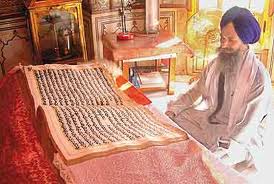


KUALA LUMPUR—The Malaysian Court of Appeal decided this week that the government can control—and ban—the use of the word “Allah,” Arabic for God. The ruling has also given wide-ranging discretionary powers to the Home Minister to make pre-emptive executive decisions.
The judgement read by Justice Mohamed Apandi Ali stated that the Home Minister had sufficient material before him to ban Catholic weekly The Herald from using the “Allah” word as “such usage if allowed will inevitably cause confusion within the community.”
“In a swoop, the court has empowered the Home Minister to make pre-emptive executive decisions to ban words or publications which he deems will cause “confusion”,” said Petaling Jaya Utara MP and DAP National Publicity Secretary Tony Pua today.
He added that with such powers, the Home Minister will be able to rule that Guru Granth Sahib, the Sikh’s Living Guru and Holy Book should be banned due to the use of the word “Allah” in Gurbani, the Guru’s word.
“Should any church in East or West Malaysia be declared illegal for the widely accepted use of the term ‘Allah’, and the court will deem itself to have ‘no plausible reason for the High Court to interfere with the minister’s decision’,” he said in a statement.
He pointed out that the ramifications of the Court of Appeal decision to empower the Home Minister were wide-ranging.
“It is not the place of the Court of Appeal to decide who are the majority and what they want, and they certainly have no competence to do so.
“It should be emphasised again that the role of the court is to determine “legality” and not making highly subjective moral judgments on ill-defined subjects,” he said.
Deciding Religion on behalf of the church


 Pua further said that the Court of Appeal judges had decided on behalf of the church on what was deemed “integral part of the faith and practice of Christianity”.
Pua further said that the Court of Appeal judges had decided on behalf of the church on what was deemed “integral part of the faith and practice of Christianity”.
The court found “Allah” not integral to the church and hence they “find no reason why the respondent is so adamant to use the name ‘Allah’ in their weekly publication, he said
“The court has no role in deciding what is integral or otherwise in any religion practised in Malaysia. Such a finding is completely irrelevant to a decision over the legality over the use of “Allah.”
“Hence the court have clearly overstepped its boundaries into the realm of theological discourse, and more critically, breached the Article 3 of the Federal Constitution which allows for other religions to be practised in peace and harmony, and and Article 11 which states that every religious group has the right to manage its own affairs,” he added.
He warned that the long-term impact of the Court of Appeal decision was well beyond the issue of the church’s use of “Allah.” This decision in regards to the Catholic Church could have a huge impact on Sikhs.
Decision must be appealed
He added that the court had given itself the power to make discretionary judgments not on the basis of the constitution and the law passed by the parliament, but by the judges’ own personal viewpoints and bias.
“Secondly, the court trampled on the rights of the minority by endorsing the oppression by the majority as well as to give discretionary and absolute pre-emptive powers to the Home Minister for actions against anyone deemed to be ‘wrong.’
“The whole argument behind the judgment is clearly unreasonable and cannot be left to stand,” he said.
He said the decision must be challenged in the Federal Court not just because it affects a particular religion’s use of a specific term, but on the implied powers of judges as well as the executive branch of the government to make discretionary decisions and mete out punishments without legal or factual basis.
The Court of Appeal yesterday allowed an appeal from the government to bar The Herald from using the word “Allah” in its Bahasa Malaysia edition, overturning a 2009 High Court ruling which favoured the Christian publication.
The panel of judges—Mohamed Apandi Ali, Mohd Zawawi Salleh and Abdul Aziz Abdul Rahim—were unanimous in their decision that there was no infringement of constitutional rights as claimed by the publishers.




